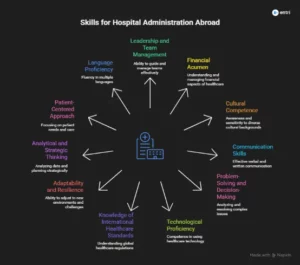Table of Contents
Hospital Administration Career Opportunities Abroad are expanding rapidly, driven by the global demand for efficient healthcare systems and skilled administrators. With hospitals and healthcare facilities worldwide seeking professionals to streamline operations, improve patient care, and ensure compliance with regulations, this field offers exciting prospects for those looking to work internationally. From managing complex healthcare networks to implementing innovative policies, hospital administration provides a rewarding career path with opportunities for professional growth and cultural enrichment.
Check out this video by Entri in Malayalam!
Explore Your Future in Hospital Administration! Enroll now
Key Takeaways:
- Hospital administration is gaining international momentum due to the global need for efficient healthcare systems. Countries are actively seeking professionals to manage hospital operations and improve patient outcomes.
- High-potential destinations include the U.S., Canada, the UK, Australia, Middle Eastern nations, Germany, and Singapore — all offering competitive salaries, benefits, and the chance to work in advanced healthcare environments.
- Key skills include leadership, financial management, cultural competence, technological proficiency, and knowledge of international healthcare standards.
- Salaries vary by country and experience level. Salaries vary by country and experience level.
- Working abroad in hospital administration offers not just financial rewards but also exposure to diverse healthcare systems, cultures, and the chance to contribute to global health improvement.
- A relevant bachelor’s or master’s degree (e.g., MHA, MPH, MBA), professional certifications (e.g., CPHQ, FACHE), and language proficiency are crucial to securing international roles.
Hospital Administration Career Opportunities Abroad: Introduction
Hospital administration is a vital field within healthcare, responsible for ensuring efficient operations, patient satisfaction, and regulatory compliance. With the global demand for quality healthcare services, hospital administration careers have gained traction worldwide. For professionals aspiring to work abroad, this field offers a plethora of opportunities in diverse healthcare systems, enabling both personal and professional growth.
This blog examines the top countries for hospital administration careers, essential skills, salary trends, qualifications, and more, to help aspiring professionals achieve their international career objectives.
Top Countries Offering Hospital Administration Careers
1: What is the primary role of a hospital administrator?
The demand for skilled hospital administrators is increasing globally, with various countries offering attractive opportunities to manage and enhance their healthcare systems. Here’s a look at the top destinations for professionals in this field:
1. United States
The U.S. boasts one of the most advanced healthcare systems in the world. With a diverse network of public, private, and non-profit hospitals, the country offers numerous roles in hospital administration, including Healthcare Administrator, Operations Manager, and Hospital CEO. Professionals are drawn to the U.S. for its high salaries, career growth opportunities, and the chance to work with cutting-edge technology.
2. Canada
Canada’s publicly funded healthcare system creates steady demand for hospital administrators to enhance operational efficiency and address the needs of its aging population. Opportunities exist across urban centers and rural areas, making it a great choice for professionals seeking variety. Canada also offers immigration pathways that make it easier for healthcare professionals to settle and work in the country.
3. United Kingdom
The UK is home to the National Health Service (NHS), one of the world’s largest healthcare employers. The NHS provides a range of administrative roles, such as Practice Manager and Hospital Administrator, focusing on improving patient care and optimizing hospital operations. Additionally, private healthcare facilities in the UK offer opportunities for professionals with specialized experience in finance, logistics, and management.
4. Australia
Australia’s healthcare system is renowned for its quality and accessibility, creating a demand for hospital administrators to manage its growing needs. With an aging population and increased government investment in healthcare infrastructure, opportunities abound in both metropolitan and regional settings. The country also offers an attractive work-life balance and comprehensive employee benefits.
5. Middle Eastern Countries (UAE, Saudi Arabia, Qatar)
The Middle East is undergoing a healthcare transformation, with massive investments in hospital infrastructure and technology. Countries like the UAE, Saudi Arabia, and Qatar offer tax-free salaries, housing allowances, and other benefits, making them attractive destinations for hospital administration professionals. These roles often involve overseeing new hospitals, managing international collaborations, and ensuring compliance with global healthcare standards.
6. Germany
Germany’s healthcare system is one of the most efficient in Europe, with a strong focus on hospital management and administration. Professionals fluent in German and familiar with European healthcare regulations find ample opportunities in both public and private hospitals.
7. Singapore
Singapore is a leading healthcare hub in Asia, offering modern facilities and advanced medical practices. Hospital administrators are an integral part of maintaining high-quality services and implementing innovative healthcare solutions. The country’s reputation as a global business center further enhances its appeal.
These countries not only offer rewarding career opportunities but also the chance to experience diverse cultures, work environments, and professional challenges, making hospital administration a truly global career choice.
Hospital Administration Course with Assured Career Growth
Hospital Administration Course by Entri App: Master essential healthcare management skills, gain certification, and secure top roles in leading hospitals
Join Now!Skills for Hospital Administration Jobs Abroad
Hospital administration is a dynamic field that requires a blend of technical knowledge, leadership abilities, and adaptability. Professionals aspiring to work abroad in this field must develop key skills to succeed in diverse healthcare environments. Here are the essential skills for hospital administration jobs abroad:
1. Leadership and Team Management
Hospital administrators must lead multidisciplinary teams, manage staff effectively, and inspire collaboration. Strong leadership ensures smooth operations, enhances staff performance, and fosters a positive workplace culture.
2. Financial Acumen
Budgeting, financial planning, and cost management are critical for overseeing hospital operations. Administrators need to allocate resources efficiently, monitor expenses, and ensure profitability without compromising patient care.
3. Cultural Competence
Working abroad often involves interacting with people from various cultural backgrounds. Understanding and respecting cultural differences in patient care, staff management, and organizational practices are essential for success in international roles.
4. Communication Skills
Effective communication is vital for hospital administrators to convey policies, resolve conflicts, and maintain relationships with staff, patients, and external stakeholders. Clear and professional communication fosters trust and ensures smooth operations.
5. Problem-Solving and Decision-Making
Hospital administrators face complex challenges daily, from operational inefficiencies to patient grievances. Strong problem-solving and decision-making skills enable them to identify issues, analyze solutions, and implement strategies swiftly.
6. Technological Proficiency
With the rise of digital healthcare, administrators must be familiar with hospital management systems, electronic health records (EHR), telemedicine platforms, and data analytics. Technological expertise ensures streamlined operations and improved patient outcomes.
7. Knowledge of International Healthcare Standards
For those working abroad, understanding international healthcare regulations, accreditation standards (e.g., JCI), and local laws is crucial. This knowledge helps ensure compliance and enhances the quality of care.
8. Adaptability and Resilience
Hospital administration roles abroad often involve navigating unfamiliar healthcare systems and adapting to new work environments. Flexibility and resilience help professionals handle change and thrive in challenging settings.
9. Analytical and Strategic Thinking
Administrators must assess operational data, forecast trends, and develop long-term strategies to improve hospital efficiency. Strategic thinking ensures that healthcare facilities meet both current and future demands.
10. Patient-Centered Approach
While hospital administrators may not interact directly with patients daily, understanding patient needs and prioritizing their satisfaction is fundamental. A patient-centered approach helps create policies and procedures that enhance care quality and experience.
11. Language Proficiency
Proficiency in the host country’s language is often essential for effective communication. In addition to English, knowledge of local languages can improve interactions with staff, patients, and regulatory bodies.
By cultivating these skills, hospital administrators can position themselves as valuable assets in global healthcare systems and build a successful career abroad.
Salary Trends for Hospital Administration Professionals Worldwide
The salary for hospital administration professionals varies significantly across countries, influenced by factors such as location, experience, role, and the type of healthcare facility. Here’s an overview of salary trends for hospital administrators in key regions worldwide:
1. United States
The United States offers some of the highest salaries for hospital administrators due to its advanced healthcare systems and high demand for skilled professionals.
- Average Annual Salary: $70,000–$150,000
- Entry-Level Roles: $60,000–$80,000
- Senior Executives (CEOs, Directors): $150,000–$300,000+
Larger cities like New York, Los Angeles, and Chicago often provide higher salaries, although the cost of living is also greater in these areas.
2. Canada
Canada’s publicly funded healthcare system offers competitive salaries, with additional perks such as pensions and healthcare benefits.
- Average Annual Salary: CAD 60,000–120,000
- Entry-Level Roles: CAD 50,000–70,000
- Senior Positions: CAD 120,000–200,000+
Salary levels may vary between provinces, with higher pay in regions like Ontario and British Columbia.
3. United Kingdom
In the UK, hospital administration salaries are structured under the National Health Service (NHS) pay bands and private healthcare facilities.
- Average Annual Salary: £35,000–£80,000
- NHS Band 5-7 Roles: £30,000–50,000
- Senior NHS Roles (Band 8 and Above): £50,000–£100,000+
Private sector roles often offer salaries comparable to or higher than NHS roles, with additional performance-based bonuses.
4. Australia
Australia’s healthcare sector is expanding, creating robust demand for hospital administrators.
- Average Annual Salary: AUD 80,000–150,000
- Entry-Level Roles: AUD 60,000–80,000
- Senior Positions: AUD 150,000–200,000+
Remote and rural areas may offer higher salaries to attract talent, along with relocation allowances.
5. Middle East (UAE, Saudi Arabia, Qatar)
Hospital administrators in the Middle East enjoy lucrative, tax-free salaries, along with housing, travel allowances, and other benefits.
- Average Annual Salary: $60,000–$120,000
- Entry-Level Roles: $50,000–70,000
- Senior Positions: $120,000–200,000+
The region’s rapid healthcare infrastructure growth has increased demand for experienced administrators, particularly in large urban hospitals and newly developed medical cities.
6. Germany
Germany offers competitive salaries for hospital administrators, particularly for those fluent in German and experienced with EU healthcare standards.
- Average Annual Salary: €50,000–€90,000
- Entry-Level Roles: €40,000–60,000
- Senior Positions: €90,000–150,000+
Healthcare professionals in metropolitan areas such as Berlin, Frankfurt, and Munich often earn higher wages.
7. Singapore
Singapore’s reputation as a leading healthcare hub in Asia translates into attractive salaries for hospital administrators.
- Average Annual Salary: SGD 80,000–150,000
- Entry-Level Roles: SGD 60,000–80,000
- Senior Roles: SGD 150,000–200,000+
Bonuses and performance incentives are common in both public and private hospitals.
8. India
While salaries in India are relatively lower than in Western countries, hospital administrators in top-tier hospitals and private healthcare facilities can earn competitive wages.
- Average Annual Salary: INR 5–15 LPA (approximately $6,000–$18,000)
- Senior Positions in Leading Hospitals: INR 20–40 LPA ($24,000–$48,000)
Metropolitan cities like Delhi, Mumbai, and Bangalore offer higher salaries compared to rural areas.
Explore Your Future in Hospital Administration! Enroll now
Qualifications Required for Hospital Administration Jobs Abroad
Hospital administration is a specialized field that requires a combination of academic credentials, professional experience, and relevant certifications. For those aspiring to work abroad, meeting country-specific requirements is essential. Below is an overview of the qualifications typically needed for hospital administration roles internationally:
1. Educational Background
A strong academic foundation in healthcare management or a related field is essential.
- Bachelor’s Degree: A degree in Healthcare Management, Business Administration, Public Health, or a related field is the minimum requirement for entry-level positions.
- Master’s Degree: Advanced roles often require a master’s degree, such as:
- Master of Health Administration (MHA)
- Master of Business Administration (MBA) with a focus on Healthcare
- Master of Public Health (MPH)
- Some institutions also value specialized degrees, such as a Master’s in Hospital and Healthcare Management (MHM).
2. Professional Experience
Hands-on experience in healthcare or related industries is highly valued by employers abroad.
- Entry-Level Positions: A few years of experience in hospital operations, healthcare facilities, or administrative roles can enhance your employability.
- Senior Roles: For managerial or executive positions, 5–10 years of experience in leadership roles within healthcare settings is often required.
- Experience with international healthcare systems or working in multicultural environments is a plus.
3. Certifications and Credentials
Certifications demonstrate expertise and commitment to the field, making candidates stand out in competitive international markets.
- Globally Recognized Certifications:
- CPHQ (Certified Professional in Healthcare Quality)
- FACHE (Fellow of the American College of Healthcare Executives)
- CHFP (Certified Healthcare Financial Professional)
- Accreditation Knowledge: Familiarity with international healthcare standards, such as Joint Commission International (JCI) accreditation, is often required for positions in globally connected hospitals.
- Country-Specific Licensing: Some countries require licensing or certification from local healthcare or administrative boards.
4. Language Proficiency
Language skills are critical for effective communication in an international setting.
- English Proficiency: Since English is widely used in global healthcare, fluency is essential, particularly in countries like the U.S., UK, Canada, and Australia.
- Local Language Skills: Knowledge of the host country’s language is often required or highly advantageous. For example:
- German for healthcare roles in Germany
- French for positions in Canada’s Quebec region
- Arabic for roles in the Middle East
5. Technological Expertise
Proficiency in healthcare technology and management systems is increasingly vital.
- Familiarity with hospital management software and Electronic Health Records (EHR) systems.
- Skills in data analytics, telemedicine platforms, and digital healthcare tools are highly sought after.
6. Knowledge of Healthcare Policies and Regulations
Understanding the legal and regulatory frameworks of the target country is essential for compliance and effective management.
- Knowledge of healthcare laws, insurance systems, and data privacy regulations (e.g., HIPAA in the U.S., GDPR in Europe).
7. Soft Skills and Leadership Abilities
While technical qualifications are important, employers also value soft skills such as:
- Leadership and team management
- Communication and interpersonal skills
- Strategic thinking and problem-solving abilities
8. Visa and Work Authorization
To work abroad, candidates must meet the host country’s visa and work permit requirements.
- Countries may prioritize skilled professionals in healthcare administration through special immigration pathways (e.g., Canada’s Express Entry, Australia’s Skilled Occupation List).
- Some roles may require validation of qualifications or additional local certifications.
Explore Your Future in Hospital Administration! Enroll now
Hospital Administration Course with Assured Career Growth
Hospital Administration Course by Entri App: Master essential healthcare management skills, gain certification, and secure top roles in leading hospitals
Join Now!Hospital Administration Career Opportunities Abroad: Conclusion
Hospital administration is a promising career path for professionals seeking to make a meaningful impact in the global healthcare sector. With the rising demand for skilled administrators worldwide, Hospital Administration Career Opportunities Abroad are expanding across diverse regions, from the United States and Canada to the Middle East and Europe. By acquiring the right qualifications, developing essential skills, and understanding the unique requirements of international healthcare systems, professionals can unlock rewarding roles in this dynamic field. For those ready to embrace new challenges and cultures, a career in hospital administration abroad offers unparalleled growth, financial rewards, and the chance to contribute to better healthcare systems globally.
Hospital Administration Course with Assured Career Growth
Hospital Administration Course by Entri App: Master essential healthcare management skills, gain certification, and secure top roles in leading hospitals
Join Now!Frequently Asked Questions
Is a master’s degree mandatory for hospital administration jobs abroad?
While not always mandatory, a master’s degree significantly enhances employability, especially in competitive markets like the U.S., UK, and Australia.
What is the best certification for hospital administrators?
Certifications like CPHQ (Certified Professional in Healthcare Quality) or FACHE (Fellow of the American College of Healthcare Executives) are widely recognized internationally.
Are hospital administration jobs in demand globally?
Yes, the rising demand for efficient healthcare management makes hospital administration a sought-after profession worldwide.
Can fresh graduates apply for hospital administration roles abroad?
Entry-level positions exist but are rare. Gaining a few years of experience locally often strengthens your application for international roles.
How long does it take to secure a job abroad in this field?
It varies depending on qualifications, country-specific requirements, and visa processing times, typically ranging from 6 months to a year.
Can hospital administrators work in both public and private healthcare sectors?
Yes, hospital administrators can work in both public and private sectors. In the public sector, they often work in government-run hospitals or healthcare institutions, while in the private sector, they manage private hospitals, clinics, and specialty healthcare centers.
What are the most important skills for a hospital administrator?
Key skills include leadership, communication, problem-solving, financial management, knowledge of healthcare laws and regulations, technological proficiency, and cultural competence. Strong organizational abilities and the capacity to manage teams effectively are also crucial.
What is the role of a hospital administrator?
A hospital administrator oversees the daily operations of a healthcare facility, ensuring efficient management of resources, staff, and patient services. They are responsible for budgeting, staffing, policy development, compliance with healthcare regulations, and maintaining high standards of patient care.
















